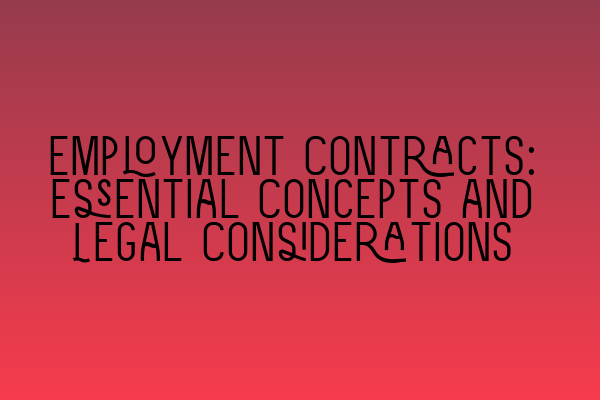Employment Contracts: Essential Concepts and Legal Considerations
When it comes to employment relationships, having a well-drafted employment contract is crucial for both employers and employees. These contracts define the terms and conditions of the employment relationship and provide a clear framework for rights and obligations. In this article, we will explore the essential concepts and legal considerations that should be included in employment contracts.
1. Parties Involved
An employment contract must clearly identify the parties involved, i.e., the employer and the employee. This includes providing their full legal names, addresses, and contact information. Additionally, it should state the job title and description of the employee’s role within the organization.
2. Terms and Conditions
The terms and conditions of employment should be explicitly stated in the contract. This includes the start date of employment, the duration of the contract (if applicable), and the working hours. The contract should also outline the employee’s rights and responsibilities, as well as the employer’s expectations.
Other essential terms and conditions may include:
- Salary and benefits package
- Holiday entitlement and leave policies
- Probationary period, if applicable
- Notice period for termination of employment
- Confidentiality and non-disclosure agreements
- Intellectual property rights
- Restrictive covenants, such as non-compete clauses
It is important to ensure that the terms and conditions comply with applicable employment laws and regulations. Seeking legal advice from a qualified solicitor can help ensure the legality and enforceability of the contract.
3. Dispute Resolution
Including a dispute resolution clause in the employment contract can help avoid costly and time-consuming legal battles in case of disagreements. This clause typically outlines the process for resolving disputes, such as through mediation, arbitration, or litigation.
4. Termination of Employment
The employment contract should clearly state the circumstances under which the contract can be terminated. This includes outlining reasons for termination, such as resignation, retirement, redundancy, or dismissal for disciplinary reasons. It should also address notice periods and any entitlements or obligations upon termination.
To ensure compliance with employment laws, it is crucial to be familiar with the regulations regarding termination, as these may vary depending on the jurisdiction and the industry in which the employment relationship exists. Consulting with a knowledgeable solicitor can provide guidance on navigating such legal complexities.
Conclusion
An employment contract is a legally binding agreement that sets out the rights and obligations of both employers and employees. By including essential concepts and addressing legal considerations, such as those mentioned above, employers can minimize potential disputes and ensure a clear understanding of expectations. Employees, on the other hand, can protect their rights and negotiate fair terms when presented with a well-drafted contract.
For more information on employment contracts and other legal topics related to the Solicitors Qualifying Examination (SQE), explore the following articles:
- SQE 1 Practice Exam Questions
- SQE 1 Practice Mocks FLK1 FLK2
- SQE 2 Preparation Courses
- SQE 1 Preparation Courses
- SRA SQE Exam Dates
